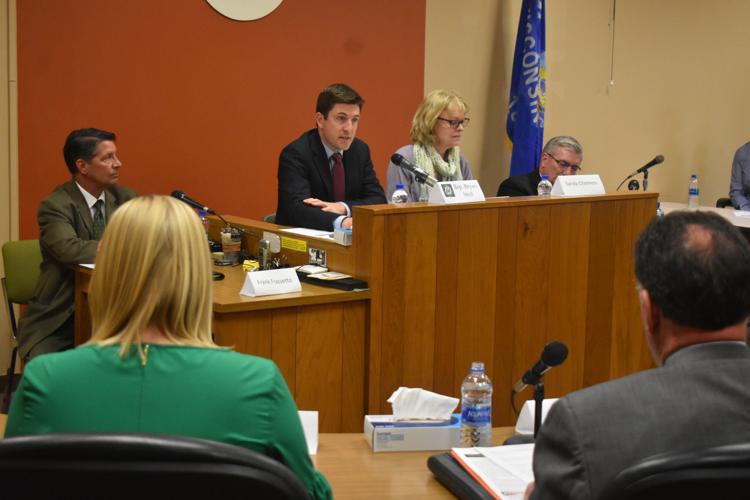 Raymond dairy farmer John Scott grew up hearing the phrase that farmers “feed the world.”
Raymond dairy farmer John Scott grew up hearing the phrase that farmers “feed the world.”
“That’s not necessarily true,” Scott said. “We feed the world that pays us and that’s why these trade agreements are important.”
Scott, along with several other individuals involved in farming and agriculture financing, spoke to U.S. Rep. Bryan Steil, R-Wisconsin, and other representatives of state and federal agencies about the current state of farming during a listening session on Thursday in Burlington.
Steil, who represents Racine County in Congress, brought representatives of the U.S. Department of Agriculture and Small Business Administration, a federal agency charged with providing support to small businesses, with him to hear testimony.
“I wanted to make sure that they got the benefit of information that we received today,” Steil said. “That they’re able to use that information to make better policy in Washington.”
The panel also talked about the United States, Mexico, Canada Free Trade Agreement (USMCA), which was recently evaluated by the International Trade Commission and is currently making its way through the halls of Congress.
“Wisconsin dairy products are sought after, not only throughout the nation as the highest quality available, they’re sought after worldwide,” Scott said. “We are invested in exports and we need Congress to invest in us.”
Over and over, different attendees told Steil and the other agency representatives that the USMCA needs to pass as soon as possible.
Cindy Leitner, president of the Wisconsin Dairy Alliance, said the dairy industry is in a recession.
“We cannot add cows and milk our way out of this recession,” Leitner said. “The dairy industry is in a crisis.”
Leitner said giving farmers access to other markets outside of the United States is key to the survival of farms.
“We’re not talking about steel, we’re not talking about plastic … we are talking about food and our food source,” Leitner said. “We need to pass this legislation.”
With President Donald Trump visiting Wisconsin on Saturday, April 27, Leitner said she hopes someone speaks to him about the dire state of farming.
“The retaliatory tariffs have got to be removed,” Leitner said. “If we can do nothing else, we’ve got to remove those retaliatory tariffs. It’s very critical. Every day we are not signing this agreement or pursuing this agreement we are losing.”
Aaron Stauffacher, associate director of government affairs for Brown County-based Edge Dairy Farmer Cooperative, said one of the good things about the USMCA is it retains access to Mexico and Canada established under the North American Free Trade Agreement.
“I don’t think we can talk about the importance of USMCA without talking about the success of NAFTA has been,” Stauffacher said. “In the dairy industry, pre-NAFTA we were exporting about 3% of our product and today based off of last year’s numbers we’re exporting about 15.8% of all dairy products in terms of milk solids.”
If USMCA passes and signed into law, Scott said it will bring some stability to the market.
“It would have an impact over the next 15 years,” Scott said.
Taking the message to Washington
After hearing the testimony of producers and financers, Steil said he got a sense of how real the situation is regarding farming in America.
“The commodity prices are low and that’s making it really hard for farmers to hold on to their farms,” Steil said. “We need to find a way to drive those commodity prices up and making sure that farmers have an ability to sell their product freely, fairly, reciprocally around the globe, is going to be an essential piece to that puzzle.”
Steil said he plans to go back to Washington, armed with new information, to advocate for farmers and workers in agriculture.
“I have to take the information that I learned from dairy farmers and corn growers and soybean growers and share that with members of districts that might not have that experience and have that dialogue on how do we get trade agreements that benefit all American workers and American farmers,” Steil said.
In the meantime, Scott will have to be patient.
“Farmers are always optimistic, especially in the spring,” Scott said. “Having Congressman Steil take the time to listen to what we had to say makes us a little more optimistic.”
Source: journaltimes.com









